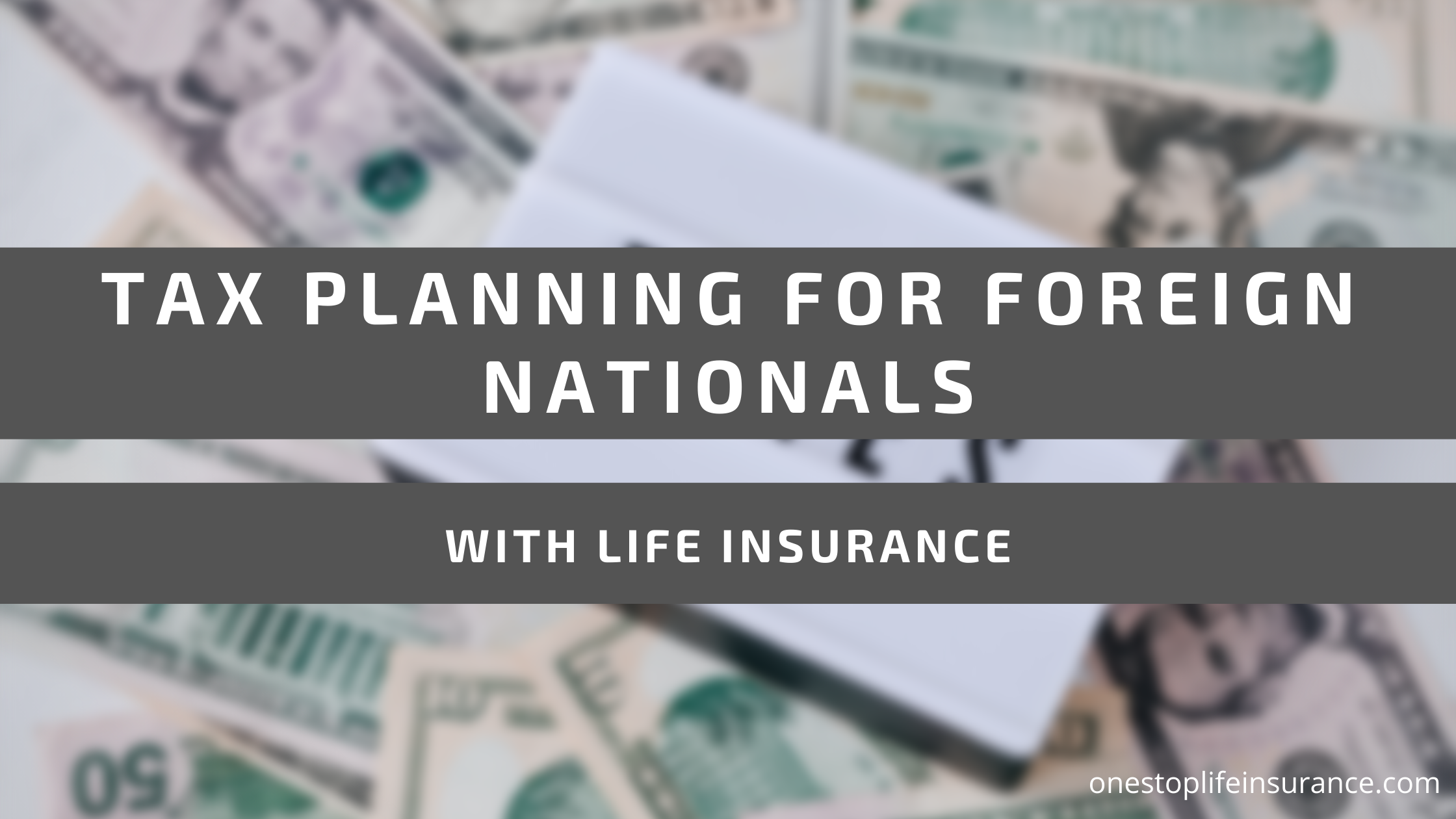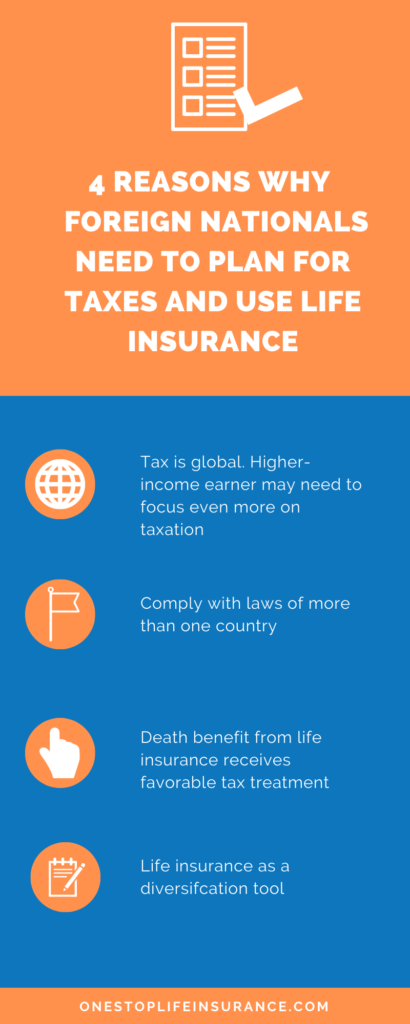Tax planning for foreign nations with life insurance
We live in times when everything is continuously changing. Remote work is gaining momentum as it is a way to adjust to the new normal. Naturally, globalization expands and with that, we felt the need to go over the steps you can take to achieve efficient tax planning for foreign nationals through life insurance.
In this article, we would touch on who needs to consider global taxation, why does it matter, and what exactly life insurance has to do with tax planning for foreign nationals.
Here are the topics we would focus on:
Who is this article intented to
Why is it important to consider the current tax environment
The 2 advantages of life insurance for foreign nationals
Important information to keep in mind
If you have any questions or would like us to review your unique situation, simply reach out to us. You can do so by giving us a call, completing the quote form on this page, or send us a message. We would be sure to follow up with you.
Prior to jumping into the topic, we would like to remind you that we are not tax planners and we do not intend to provide you with tax advice. Please reach out to an international tax consultant for a better assessment of your personal situation.

Who is this article intent to
We feel this article is intended for anyone with foreign ties or considering living abroad. We’ve identified and created 4 separate categories.
US citizens who live/work abroad
More Americans are choosing to travel the world and with the increase of remote work opportunities, they are considering living abroad.
Let’s face it, who would not the opportunity to live and work on the turquoise beaches of the Caribian?
But here’s the catch:
Did you know that you would need to pay close attention to the US tax regulations as well as those in the country/region you live in? Here are just some of the taxes you might be exposed you as an American living abroad.
- US Estate Tax: Worldwide property owned by decedent subject to taxation
- US Gift Tax: Worldwide gifts subject to taxation
- Exclusion Amount for Transfers during Life and/or Death: also changes every year. Currently, it is at $11.5mil, however, there are expectations that it would be reduced
- US Generation Skipping Tax: Generation-skipping gifts and bequests subject to taxation
- US annual Gift Tax Exclusion: the numbers are changing every several years.
We’ve dedicated an entire article on life insurance for Americans working/living abroad. There you could find some of the requirements and process of obtaining coverage.
Foreign nationals with US ties
There are many examples of financial ties foreign nationals may have to the US and therefore, being exposed to US tax events.
- Own a property in the US
- Runs a business in the US
- Sells goods and services to the US
- Amount of time spent in the US per year
- Sometimes, even investing in US stocks, could create a tax event and etc.
Did you know that the UK prime minister, Boris Johnson, is exposed to a US tax? Yes, many may not be aware of it, but he is born in the US and therefore a US citizen.
Here are some of the taxes a Non-resident alien may be exposed to:
- US Estate Tax: US situs property owned by the decedent subject to taxation.
- Non-US situs property and certain property specifically not considered US situs property not subject to taxation.
- US Gift Tax: Gifts of tangible US situs property subject to taxation.
- Gifts of intangible US situs property and gifts to of non-US situs property not subject to taxation
The following two categories are pertaining to the marriage between a US citizen with a non-US citizen. We’ve divided the category into 2 based on who is holding/passing on the assets:
US citizens married to foreign nationals
We’ve dedicated a separate article on the topic of a foreign spouse.
The key concept is what would be the value of assets available to transfer to the surviving spouse. The outcome would be dependent on who passes away first and whether there is a Qualified Domestic Trust (QDOT) established.
Foreign nationals married to US citizens
If you are a nonresident alien married to a US citizen, you could transfer assets without limits.
However, upon your death, only $60,000 could be transferred exempt from taxation.
This is where having a QDOT established could help.

Going into the benefits of a QDOT is beyond the scope of what we do. Our main objective is to advise you of the possible tax consequences and share the possible steps you could take to minimize any tax exposure.
Why is it important to consider the current tax environment
The current tax environment is very uncertain, to say the least. Efficient tax planning is an absolutely necessity especially to foreign nationals for 4 reasons:

Tax is global – based on which category you belong, you may be exposed to a tax on your worldwide assets
Your tax obligations may be more complicated based not only on the foreign country you live in, but also even the US state you are associated with.
Life insurance can be a diversification tool for better risk control and as a way of a wealth transfer (we would touch on these points below).
Due to the current proposed changes in the US tax laws, higher-income earners may need to focus even more on taxation.
The 2 advantages of life insurance for foreign nationals
We covered who and why should pay attention to the current tax environment. Now it is time to turn our attention to the way that US-issued life insurance can help as a part of the comprehensive process of tax planning for foreign nationals.
There are 2 key advantages of life insurance for global citizens:
The favorable treatment of the death benefit
It is not a secret that generally proceeds from life insurance are considered tax-free to the beneficiary. Typically the death benefit from a US-issued life insurance policy “travels well” and may not be subject to tax in any country.*
*Again, please keep in mind that we are not tax professionals. There could be countries whose laws are different and may not allow for the favorable tax treatment of the death benefit. Please always check with an experienced tax advisor, as often times there could be tax treaties between the US and the foreign country of residence.
For years in which there is a Federal estate tax, IRC §2105(a) excludes explicitly life insurance proceeds on the life of the Non-resident alien (NRA) from the NRA’s US gross estate.

A non-resident alien can own a life insurance policy on his/her own life, and provide a death benefit to his/her family both U.S. federal income and estate-tax free! Under [IRC 2105(a)], the death benefits from life insurance will NOT be a part of the NRA’s US taxable estate.
Favorable treatment of the cash value account
There are types of policies that provide not only death benefit when the insured passes away, but also offer cash value growth. The cash value account offers a number of benefits to US citizens as well as to non-resident aliens.
- Under the current US income tax law, the cash value accumulates tax-deferred. In other words, there is no tax on growth.
- The money under a cash value account from a life insurance policy can be accessed via loans and withdrawals. Under the current tax law, the owner of the life insurance policy could access cash value without US federal income tax (as long as it still meets the definition of life insurance).
- The money in the cash value account is accrued and paid in US dollars.
- The cash value account in life insurance could also be considered as diversification of the owner’s assets portfolio.
Here is an example:
$100,000 withdrawal during a retirement year. 401(k): 32% Ordinary Income Tax, Mutual Fund: Assumes no-cost basis, and 15% Capital Gains Tax. Actual results will depend on your personal financial situation.
[table id=7 /]
Important information to keep in mind
In the last section of the article, we would like to list some key things you should keep in mind when it comes to tax planning for foreign nations using US life insurance
- To qualify for coverage, you would need to demonstrate strong financial ties to the US. In addition, you would be subject to medical and lifestyle underwriting
- All activities including solicitation, completion of the application, call interview, medical examination, and contract delivery must take place in the US
- Not all countries of residence could be considered for coverage, due to analysis of government, travel services, industry data, and current conditions
- The income, gift, and estate tax treatment of a US-issued life insurance policy owned by a foreign national will depend on each country’s own laws
- The countries where foreign nationals reside may also have their own rules regarding the tax treatment of life insurance proceeds. Therefore you need to consult with a tax and legal advisor to understand the treatment of the policy by the country of residence
- In addition, some non-US countries may impose fines and/or penalties (civil and criminal) against their residents or citizens who purchase a US-issued life insurance policy
- In an effort to avoid double taxation, the US has income, estate, and gift tax treaties with many countries.
In conclusion,
What we want you to take away from this article is that there are a lot of factors that come to play when determining one’s tax exposure. It is essential to keep an eye on current regulations and consider life insurance as a part of efficient tax planning for foreign nations. There are many strategies that you can employ to stay in compliance and to minimize your tax exposure. Make sure you understand the benefits of life insurance for foreign nationals and see if it makes sense to you and your overall goal.
We hope you find this information helpful. Should you have any additional questions or would like us to review your personal situation, simply reach out to us.
Thank you!
